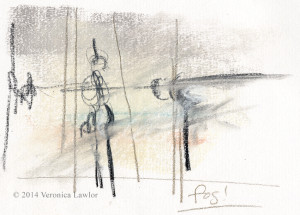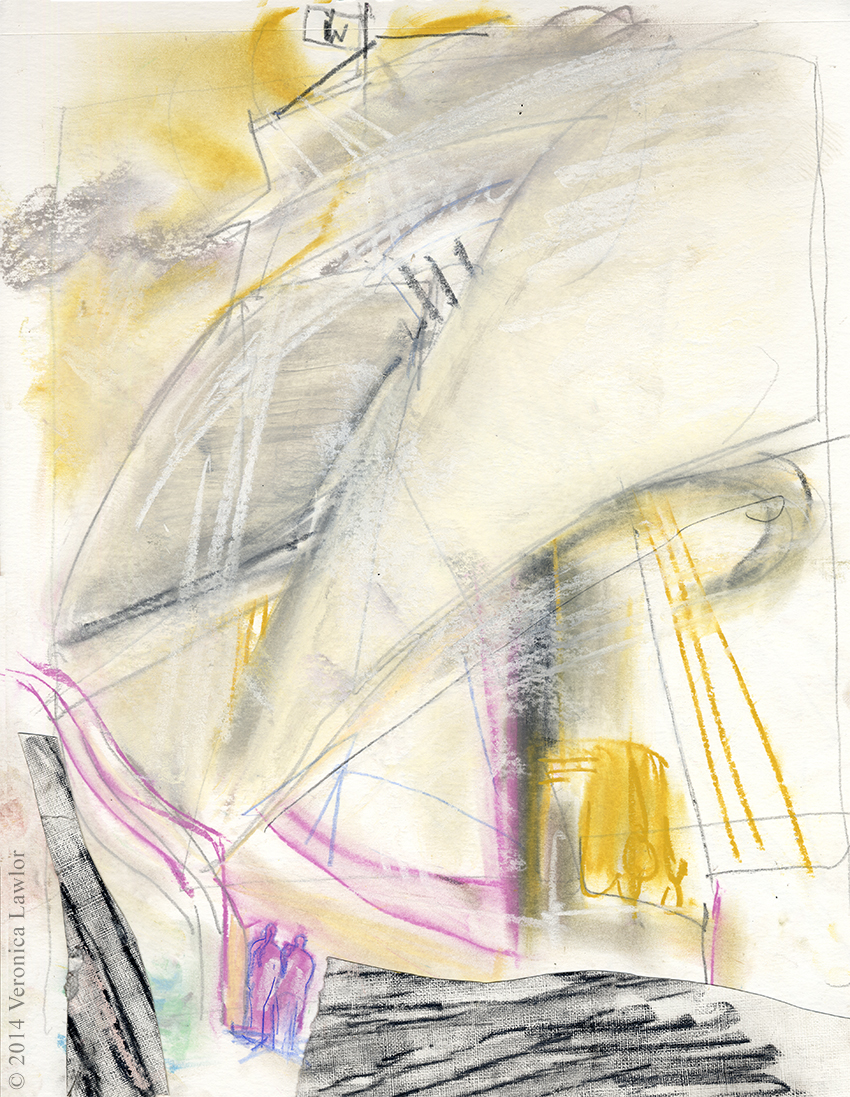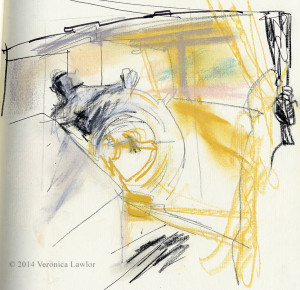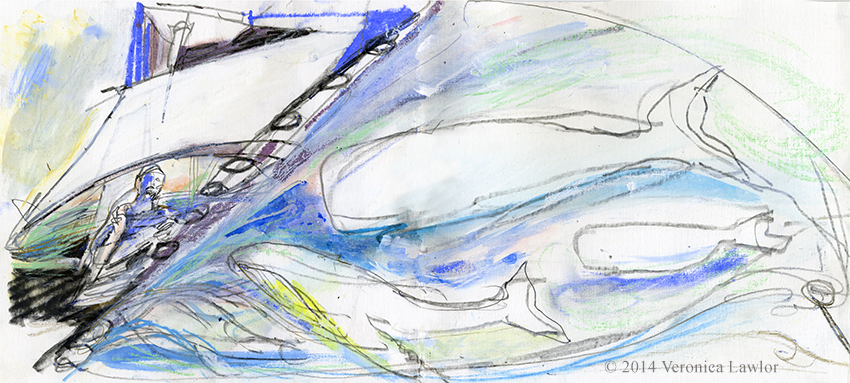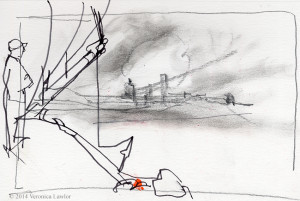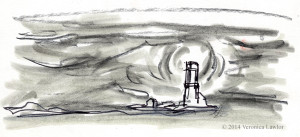This past July, I had the honor of being selected as one of 79 “38th Voyagers” to sail on the restored whaling ship Charles W. Morgan, as she made her way along the New England coast. The program, through Mystic Seaport in Connecticut, and partly funded by a grant from the National Endowment for the Humanities, sought to bring artists, scientists, writers, and other academics on board, to see what their experiences would create.
I was placed in the Provincetown to Boston leg, and what follows is my own experience on the ship:
Part Three
“It is not down in any map; true places never are.”
Herman Melville, Moby Dick
As the Charles W. Morgan moved silently through Cape Cod Bay, a thick cloud of fog and mist settled over the ship.
In that magical atmosphere, she seemed transformed into another ship, from another place and time. Which, of course, she was.
Putting our trust in the captain and crew, we on board could not see where we were going, or have any idea how we would get to our destination. I drew slowly, methodically, as the ship moved forward into an unknown future. How fitting this foggy environment was for the next stage of our 38th voyage.
The Morgan had made peace with the whales in Stellwagen Banks, or rather, the whales had made peace with the Morgan. She had accomplished an important mission of healing through that contact, and by her visit to the whale sanctuary she had also brought attention to the plight of the whales and the importance of preserving our oceans for generations to come.
Our next steps are a bit less clear. The Morgan has brought attention to the issues of our oceans, but how will humanity make the changes that will create a new beginning? We move forward now with knowledge of the past, but we must change our course to ensure preservation of our future.
The helmsman had no way of knowing in which direction he should steer the ship, and the Chief Mate looked out into the distance to follow the tug Sirius, our guiding star. He called back the instructions to the helm.
We, too, can look to those forward thinking individuals who are guiding us, studying the oceans, and showing us the way to the future. One of them, Jean-Michele Cousteau, was on board the Morgan with us, traveling to Boston to speak about the future of our oceans. I only hope that we heed the call of Jean-Michele and other scientists, visionaries who can see through the fog of misinformation that often surrounds us.
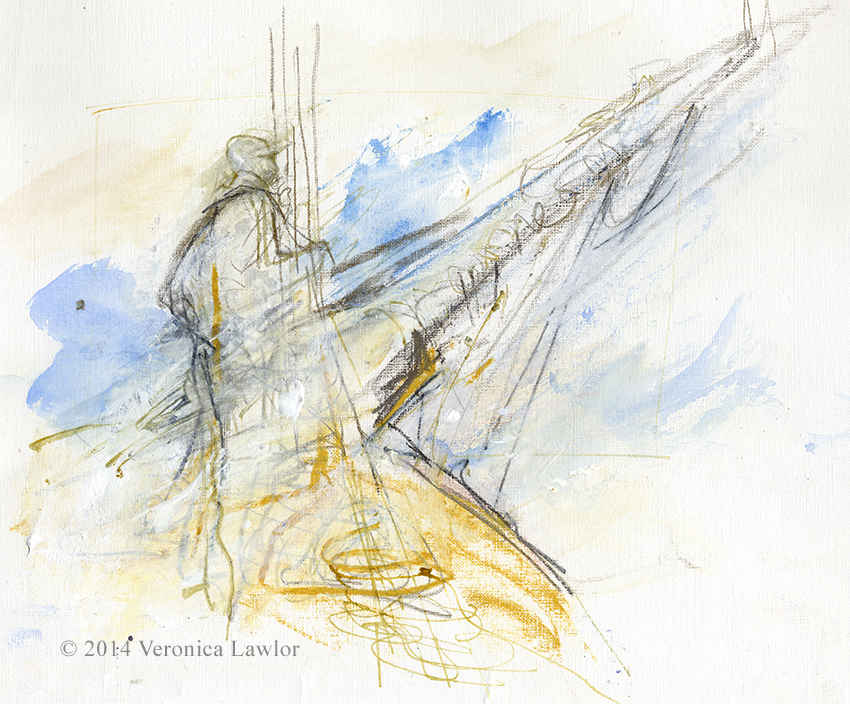 the chief mate looking into the fog
the chief mate looking into the fog
As I thought of these things, a lone voice rang out over the deck. I looked up from my drawing, and saw one of the crew members, who had begun singing an old sea shanty. (Shanty comes from the old French “chantez”, or to sing: They were sung by sailors to pass the time and lighten the workload.)
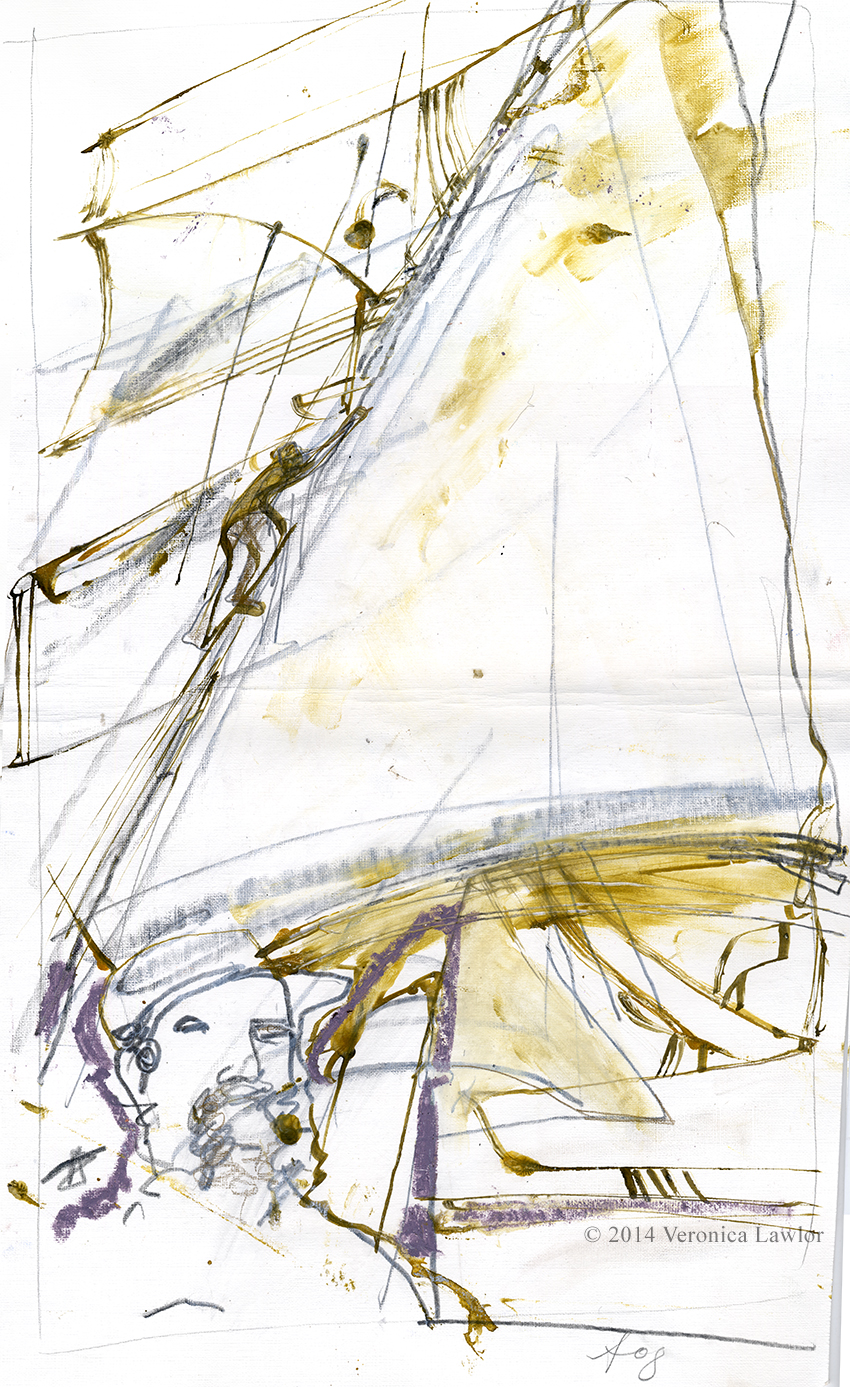 He sang a traditional song of inspiration for the crew: “keep on whaling boys!” He sang soulfully, of noble work, and of the endurance of the human spirit. As he sang, a crew member climbed the rigging to adjust the sails. The dedication of the crew became the perfect metaphor for the next steps of our journey. We can appeal to the noble impulses within and work together, as one of many species living on this planet, to make a difference. As Jean-Michele Cousteau has said so eloquently, we are the only species that has this ability to transform our earth and seas. What an honorable goal.
He sang a traditional song of inspiration for the crew: “keep on whaling boys!” He sang soulfully, of noble work, and of the endurance of the human spirit. As he sang, a crew member climbed the rigging to adjust the sails. The dedication of the crew became the perfect metaphor for the next steps of our journey. We can appeal to the noble impulses within and work together, as one of many species living on this planet, to make a difference. As Jean-Michele Cousteau has said so eloquently, we are the only species that has this ability to transform our earth and seas. What an honorable goal.
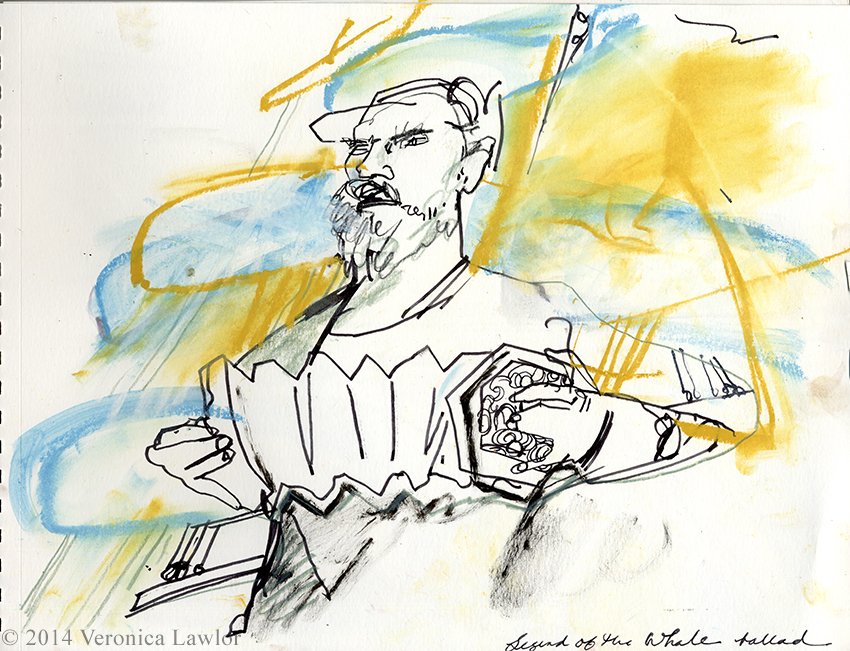 The sailor continued to sing to a spellbound audience. One old French shanty, The Legend of the Whale, caught my imagination. Sung from the whale’s point of view, the lyrics depict a bemused kind of detachment that the whales might have, watching the whalers in their small boats coming out to attack.
The sailor continued to sing to a spellbound audience. One old French shanty, The Legend of the Whale, caught my imagination. Sung from the whale’s point of view, the lyrics depict a bemused kind of detachment that the whales might have, watching the whalers in their small boats coming out to attack.
One line rang out, at the song’s end: “If they treat each other the way they treat us, we won’t have to worry about them for much longer.”
Whoever wrote those lyrics must have had the same intuition shared by many – that the whales have more knowledge and wisdom than we can understand. Millions of years ago, the first animals left the water to live on dry land, including the ancestors of modern whales. Why did they then return to the oceans? What do they understand that we don’t? Maybe some day we will know. Until then, perhaps we can start treating the whales, and each other, with a lot more compassion.
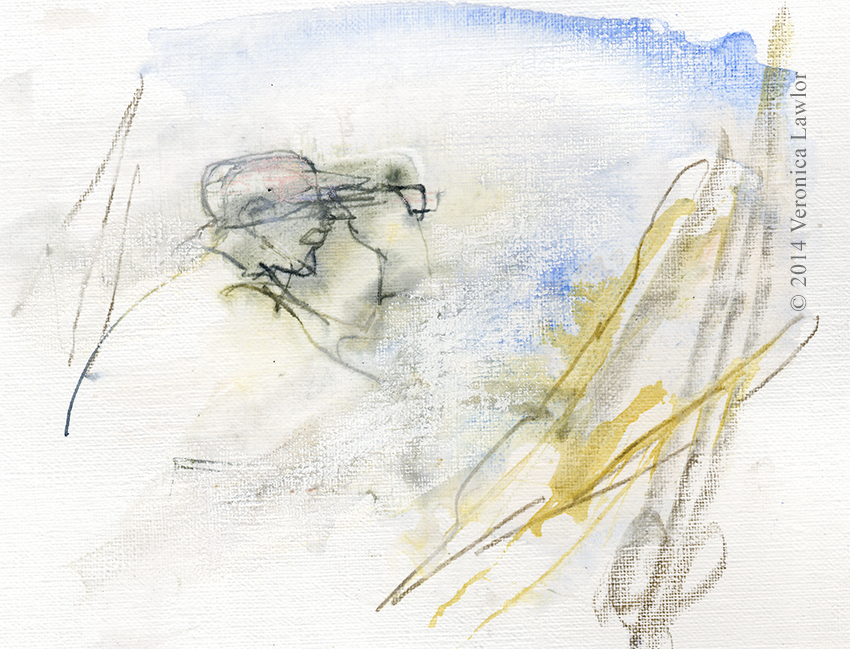 Captain Kip gazes out through his binoculars
Captain Kip gazes out through his binoculars
Captain Kip looked out into the fog, and the call went out – we were approaching Boston! The skyline of the city was a faint shape in the distance.
Many smaller boats began gathering around us in celebration, and the voyagers and crew ran to the sides of the Morgan to get a better view of the land beyond.
We passed the lighthouse guarding the harbor, and the excitement on deck grew. Although we had been towed through the fog by Sirius, there was talk on board that we would be sailing in Boston harbor, untethered, by the power of the wind alone. Freedom!! No one wanted to see the Morgan put under too much strain, but we all hoped she would sail unfettered before we met land in Boston.
While the captain and crew discussed the possibility of a free sail, we 38th voyagers had an opportunity to climb aloft (quite exhilarating and a bit scary, by the way.) The trick is to climb slowly, and never have fewer than three points of contact with the tarry ropes.
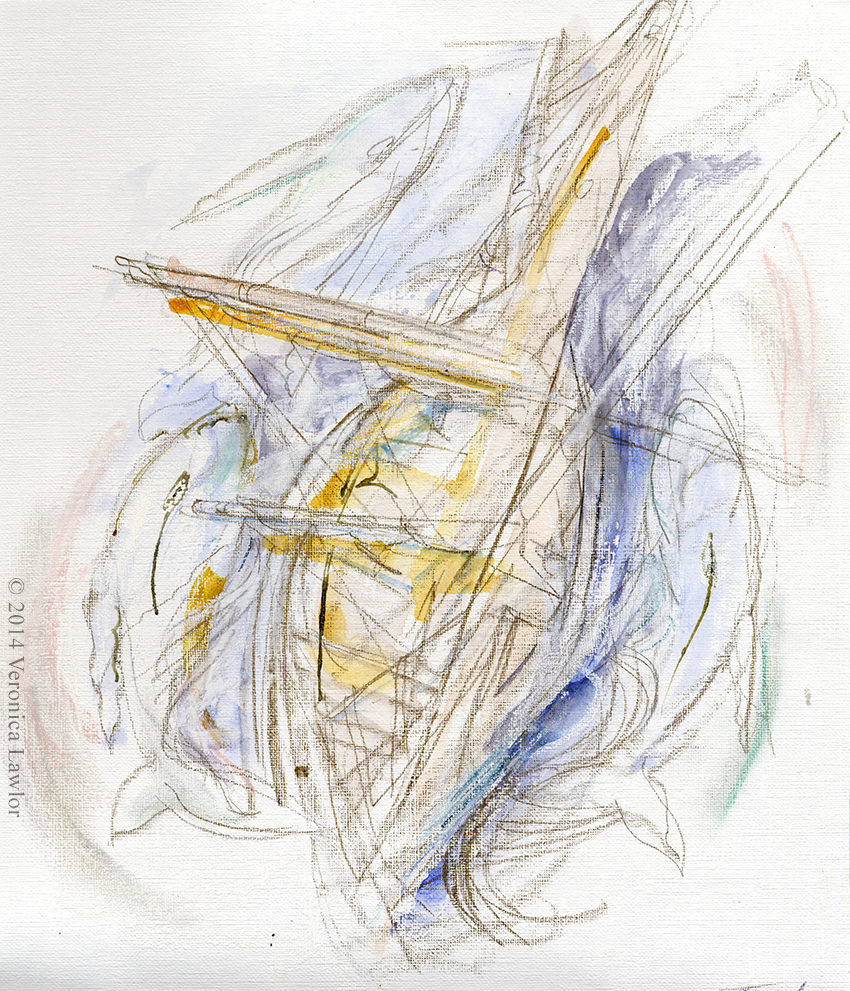 looking down at the Morgan’s deck
looking down at the Morgan’s deck
As I climbed higher and higher into the sky, one careful step at a time, the reality of the ship below fell away. I no longer heard the crew and passengers below: only the sounds of the wind and the waves filled my ears. From my vantage point aloft, I could see the waters of the bay surrounding us on all sides. I imagined I could look down and see the whales of the past, swimming together, circling our ship, guiding us with their wisdom toward our future relationship with the oceans.
I then imagined that we were sailing on another voyage, a voyage not on any map, but a voyage of the human spirit. A voyage toward a world where our oceans are clean and teem with life, our forests are green and rich, and our rivers run crystal clear. It’s a voyage through the fog and mist, a voyage through the unknown. We can not see the final destination, or even fully understand how we will get there, but it is a destination worth aiming for. We have no choice.
Next part: sailing into Boston
